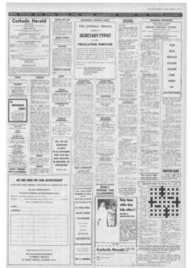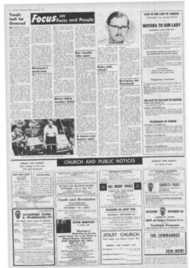Page 8, 27th August 1971
Page 8

Report an error
Noticed an error on this page?If you've noticed an error in this article please click here to report it.
Tags
Share
Related articles
Stop Human Rights Abuse In Northern Ireland
Canon Eric Elliott,
Ueen Honours 12 Catholics
Church Urges End To Sudan Civil War
Border Should Remain Says Priest
Tough task for Ormerod
FOCUSFaocnts and People BRIGADIER Denis Leon
ard Ormerod, a 49-yeavold Catholic, faces one of the toughest tasks of the security forces' touchy role in strifetorn Northern Ireland.
He must build up from scratch the Ulster Defence Regiment, which now replaces the hated all-Protestant "B Specials" who were disbanded at the behest of the former British Labour Government.
As commander of the U.D.R. -composed of may former "B Specials" and also about 500 Catholics who have been encouraged to join---Brigadier Ormerod must mould the entire group of 4.500 into a disciplined and tight-knit team.
The U.D.R., which is under the overall command of the British Army G.O.C. in Northern Ireland, is not involved in riot situations in Belfast or elsewhere. Its job is to guard key installations and man roadblocks throughout the Province.
But since 'the recent troubles and internment. the Brigadier's goal seems more and more difficult. In the last two weeks almost 30 of the roughly 500 Catholics in the Regiment have resigned, as a protest against internment.
The most recent group re. signing-four Catholics of the Co. Tyrone platoon-said that promotion was denied to Catholic members of the force while former "B Specials" rose quickly in the ranks. They also claimed, along with other Catholic members and ex-members, that the majority of patrols were carried out in Catholic areas.
One Belfast man who re• signed said, "It was because of the brutality of the Army in my area. I couldn't put 'the uniform on again."
But another man said, "1 haven't made up my mind yet whether to stay or go. 1 would like to see the U.D.R. nonsectarian, but if we leave we're
just re-creating the B Specials."
This is what Brigadier Ormerod must prevent or he may be the last Catholic in the Regiment. The father of eight children, he is no stranger to Ireland-or Irish regiments. He served with the First and Second Battalions of the Royal Irish Rifles and commanded the First Battalion from 196567.
During a wartime tour of duty in Malaya he was mentioned in dispatches and was awarded the M.B.E. He was educated at Downside and when he went to India in 1940 he was too young to he commissioned and joined the Bombay Light Horse as a trooper. He was commissioned a year later and served with the Gurkhas in Malaya and in Greece with the rank of major.
Monsignor's speak-easy
THE Most Holy Trinity parish in the centre of the motor car Mecca of Detroit has received a back-handed compliment from a city newspaper columnist. Being seized with an emergency thirst one night after the bars had closed, the journalist had it assuaged by the parish priest, Mgr. Clement Kern, a teetotaller.
The columnist said : "Holy Trinity must be the only rectory in town where a fellow could get a drink of tequila at 4 a.m." This is one of the parish's least claims to civic fame.
Mgr. Kern, aged 62, along with his bishop, Cardinal Dearden of Detroit, were the only two clergy appearing in a list selected by local civic leaders as Detroit's "Ten Big Wheels." This means the ten men whose power and influence shape the city's life. The other members of the list, defined as the city's "movers and shakers," included the heads of Fords and General Motors, a labour union president, a financier and the city mayor.
Mgr. Kern, was described in the citation as "the conscience of the community" and "a Roman-collared version of Robin Hood in that he will accept money from anyone and give it to the poor."
This priest does not confine his ministry to the Mexicans, Puerto Ricans. blacks, Cubans and "poor whites" who largely comprise his parish. The panel making the nomination noted that anyone at any hour of the day can get instant help at Most Holy Trinity.
Mgr. Kern keeps his presbytery stocked with food, medicines, money for the needy and a few bottles of donated liquor for the occasional toast, which he himself makes in ginger ale, for the occasional large donation that conies his way.
Of Cardinal Dearden. a member of the judging panel said: "This reticent man has tremendous power and influence which he doesn't use very much, but when he does, that which he sets out to do happens."
"Project Equality," which began in the Detroit archdiocese in 1965, provides that any contractor or sub-contractor seeking work from the archdiocese must prove that he is an "equal opportunity employer." That is that he does not practise racial discrimination.
Mount Athos 'invader' foiled
APIECE of extra-territorial "women's lib" received a sharp rebuff from the Greek police last week when a pretty Strasbourg schoolteacher was charged with violating the constitutional charter of Mount Athos. the home of a thousand Greek Orthodox monks.
Mrs. Albert Vurgard, fresh from the land of equality, liberty and fraternity, decided to swim ashore on this allmale bastion where the rules insist that even domestic animals are male.
Mrs. Vurgard, aged 26, is only the second Frenchwoman known to have violated the Mount Athos ban on females. In 1928 the writer Marie Choisic disguised herself as a man and toured the monastic community without being detected.
Don Camillo rides again
IIFE still seems to be dead4 I set on overtaking literature. Hot on the heels of a FOCUS item last week dealing with a situation in Mexico which mirrored the plot of a successful novel comes something equally colourful, though not as serious, from Italy.
Readers of the late Giovanni Guareschi's "Don Camillo" novels will find a familiar flavour about the recent goingson in Ferrere di Asti, Italy. The verbal ideological battles between the local parish priest, Don Eraldo Armosino and the village Communist boss, Leopoldo Trichero, culminated in a challenge to a bicycle race, the loser being pledged not to talk politics for a year.
Don Eraldo arrived two hours late for the race, which was watched by almost the entire 1,316 population of the town. He had been ringing the church bell, and his 82-year-old mother declined to watch the race but remained in the church to pray.
Off they shot with Trichero, 15 years younger than his opponent, giving the priest what he felt was a fair start. Don Eraldo, riding in a bicycle race for the first time in his life. never once fell behind and shot over the finishing line to win by two minutes in the fourmile event.
The popular priest was carried shoulder high by his delighted supporters, who let him down only when he insisted he wanted to say Mass. Erichero, a 42-year-old carpenters' union official, said breathlessly : "I must not be in good condition. It will hurt not to talk politics. But a promise is a promise."
A Jewess may become saint
rHE writings of Edith 1 Stein, who took the religious name of Sister Teresa 13enedicta of the Cross, are shortly to be sent to Rome in view of the possible opening of her cause for beatification, according to an announcement by the Cologne diocese.
Born in 1891 in Wroclaw,
now part of Poland, Edith Stein, a German Jewess, became a Catholic in 1922 and entered the Carmelites in Cologne in 1933.
She went to Holland in 1938, but under the Nati occupation Of that country she was sent to Auschwitz concentration camp where she was executed on August 9, 1942.
Down with school!
CREEPING snail-like to school might well have more wisdom about it than most of us who have been through the educational process are likely to concede if we take seriously 'the ideas of Monsignor Ivan Illich. who works outside his priestly ministry with the permission of the Church.
In his book "De-schooling Society" which was recently published in America, he attacks the schooling system on the grounds that it assists us to become slaves of the technology which should be serving us and all too often is not. He sees the schooling system as a symbol and a major instrument of destructive technologies.
He tends to divide technology into "manipulative" and "convivial." The former is typified by the car, which is seen as increasingly and oppressively distorting human life, instead of serving the transpor't needs of people which as yet go unfulfilled. The latter is personified by the telephone, which facilitates human interaction without manipulating it.
The educational process, castigated many years ago by Hilaire Belloc, that now somewhat underrated Catholic, is attacked by Mgr. Illich on several counts. It compels children, on the 'assumption they can be compelled. to learn. It segregates the child in a highly artificial environment away from the real life in which the child learns best.
Furthermore, it is based on the unfounded proposition that learning consists of being taught by the teacher and promotes the folly of identifying education by the number of years of school completed and the number of degrees Mgr. Illich's criticism, however, goes much deeper. He 'thinks that the function of socalled education is not to educate but to instil into the child "rising expectations," to create in him those needs that enable manipulative technologies to survive and flourish.
This means to compel him to compete for ever more products and ever greater consumption. He would like cornpulsory education made away with to provide for a system of schooling that would enable men to identify authentic needs and create authentic technologies to serve them.
Reviewing the Priesthood
THE diaconate is not the only part of the Sacrament of Order coming under scrutiny as the Church reviews its perspective in carrying out its mission.
Fr, Terence Bucher, curate at St. Winefride's, Wimbledon has written a booklet entitled "What Is A Priest?" in which he argues, as part of the debate on the ministry called for last year by the Pope, that the priesthood need not be confined to a professional caste.
He suggests that the priesthood should be given more widely to lay leaders of neighbourhood groups who would continue to live their married lives, thereby encouraging a rich variety of parochial activity. These -elected leaders" and the existing parish priests, says. Fr. Buchner, might work as equal partners under the chairmanship of a dean of a wider area.
In his study of the priesthood, in which he quotes liberally from theologians and Vatican Council documents, he traces how the uniqueness of the Christian priesthood had become obscured over the centuries. It became over-concerned with the ceremonial and the sacred to the detriment of proclaiming the Word.
Fr. Bucher, aged 27, was born in Swindon and ordained for Southwark archdiocese in 1968. With the backing of his parish priest, Fr, Michael Compson, he has been closely concerned with the setting up of 20 house groups in his Wimbledon parish.
blog comments powered by Disqus









